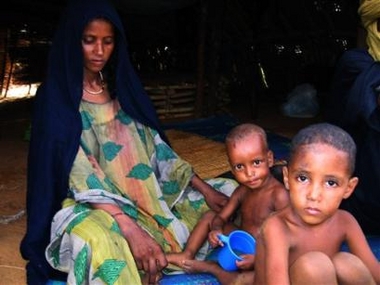Monday morning mid-summer August 2005:

1 on vacation in Crawford [NY Times]
2.5 million hungry in Niger [AP]
Back to work after the nationwide hot weekend, barbeques, sports playing and watching. Back to work for some—the shuttle astronauts were supposed to get some time off after almost 2 weeks fixing the vehicle they rode in, but the “unstable” weather at the Florida landing site made the NASA decision-makers “uncomfortable.” Without that warm fuzzy comfort zone, they don’t want the possibility of rain to crack a multi-thousand-degree-heated ceramic tile and break the shuttle, again, and kill any more astronauts, not to mention the multi-thousand-employed NASA space program.
And the leader of the free world—he’s still out of town at the ranch on a five-week vacation. He’s gonna stop shredding shrubs for a minute though in order to sign the cash-fat oil-company friendly energy bill. Don’t want to hold up that cash-cow legislation for friends of the chief exec--read President—even if it means disrupting the official time off.
Oil prices hit a new record high near $64 on Monday after warnings of militant attacks in the world's biggest oil exporter Saudi Arabia and on worries about refinery outages in the United States.--By Janet McBride, Reuters, Monday, August 8, 2005
In an MSNBC poll 84% said they were very concerned about US dependence on oil. Here’s what several million people in Africa are concerned about:
"We have no cattle, we have no goats, no sheep and no horses. We sold everything to buy food," Bishi said. "Many families have left. We have no money to buy millet and nothing to sell. This village has already died."—Villager in Niger, “Season of Destruction Returns to Niger,” Robyn Dixon
Typical of stories in this very poor region of Africa, this villager represents millions of people who simply don’t have enough to eat every day. In this day of the internet, satellite transmission, and videophones, we Americans can be updated instantly and profoundly about the needy people in all parts of the world. It may be impossible immediately to help everyone everywhere, but it is inexcusable to ignore the increasingly well-publicized tragedy of the famine in Niger.
While Bush cuts bushes in Crawford, Texas, one wonders if he gives any thought to the concerns of Americans paying more for gas, some even paying such a high price for necessary commutes that they may have to cut back on other necessities, such as clothes for the kids going back to school, or enough food to eat. And while US taxpayer money is wasted on the high price of maintaining the Iraq occupation, what about the victims of natural disasters around the world?
LETTER TO THE EDITOR Los Angeles Times
Starvation in Africa
August 8, 2005Re "In Niger, Hunger Hits Crisis Level," Aug. 5
Our compassionate, conservative president used phony information about Niger selling yellowcake uranium to Iraq as part of his
justification for the current war on the hapless Iraqi people. Tens of thousands of malnourished children in Niger today face death from starvation. In March, an appeal to the world for $16 million in food aid for Niger resulted in $1 million in contributions. We are currently spending, conservatively, $4 billion a month in Iraq. That comes to about $133 million a day. Or about $5.5 million per hour. Therefore, devoting roughly two hours of Iraqi war spending could have possibly
avoided the impending starvation epidemic in Niger. I guess preventing starvation in Africa doesn't get you too many votes from America's heartland.
Cindy Sheehan is camped nearby the ranch in Crawford waiting to hear from the Commander in Chief what noble cause her son died for in Iraq. Cindy has a mission in life, and her own noble cause to push, but before her president can come to see her, she may be arrested for endangering national security.
When George W leaves his ranch to go visit the vigil-sitting mom, maybe he’ll also tell the press how American money and technology are going to help solve the crises of hunger in Africa and the Tsunami-ravaged regions, and even right here at home in the USA. Or maybe he’ll just stay on the ranch and go straight back to work after Labor Day, leaving all these issues untouched completely. Signing the energy bill might be all he can handle right now, in the hot steamy summer days of August, 2005.

No comments:
Post a Comment
Comments signed Anonymous will not be published.